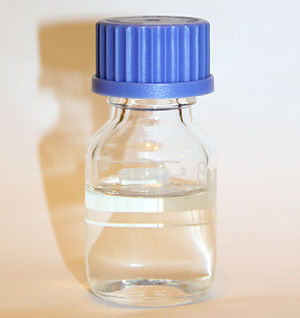Difference between revisions of "Propylene carbonate"
| Line 1: | Line 1: | ||
| − | [[File: | + | [[File:Sample of propylene carbonate.jpg|thumb|Lab grade propylene carbonate]] |
| − | '''Propylene carbonate''' (often abbreviated PC) is an organic compound with the formula | + | '''Propylene carbonate''' (often abbreviated PC) is an organic compound with the formula CH<sub>3</sub>C<sub>2</sub>H<sub>3</sub>O<sub>2</sub>CO. It is a carbonate ester derived from propylene glycol. This colorless and odorless liquid is useful as a polar, aprotic solvent. Propylene carbonate is chiral but is used exclusively as the racemic mixture. |
==Properties== | ==Properties== | ||
===Chemical=== | ===Chemical=== | ||
| − | Propylene carbonate is often used as a solvent for electrolysis | + | Propylene carbonate is often used as a solvent for electrolysis. |
===Physical=== | ===Physical=== | ||
| − | Propylene carbonate is a colorless liquid freezing at -48.8°C and boiling at 242°C. | + | Propylene carbonate is a colorless liquid freezing at -48.8°C and boiling at 242°C. Propylene carbonate has a vapor pressure of 0.13 mmHg at 20°C, and 0.98 mmHg at 50°C<ref>http://www.sigmaaldrich.com/catalog/product/sial/310328</ref>. |
| − | Propylene carbonate has a vapor pressure of 0.13 mmHg at 20°C, and 0.98 mmHg at 50°C<ref>http://www.sigmaaldrich.com/catalog/product/sial/310328</ref>. | + | |
==Availability== | ==Availability== | ||
| Line 14: | Line 13: | ||
==Preparation== | ==Preparation== | ||
| − | PC can be prepared from 1,2-propylene glycol and a metal carbonate | + | PC can be prepared from 1,2-propylene glycol and a metal carbonate. Described here: [http://www.doiserbia.nb.rs/img/doi/1451-9372/2011/1451-93721100018Z.pdf] |
| − | Described here: [http://www.doiserbia.nb.rs/img/doi/1451-9372/2011/1451-93721100018Z.pdf] | + | |
==Projects== | ==Projects== | ||
| Line 21: | Line 19: | ||
==Handling== | ==Handling== | ||
| − | |||
===Safety=== | ===Safety=== | ||
| + | Propylene glycol has little toxicity. | ||
===Storage=== | ===Storage=== | ||
| Line 31: | Line 29: | ||
<references/> | <references/> | ||
===Relevant Sciencemadness threads=== | ===Relevant Sciencemadness threads=== | ||
| − | [http://www.sciencemadness.org/talk/viewthread.php?tid=29291 Electrolysis of alkali salts at STP] | + | *[http://www.sciencemadness.org/talk/viewthread.php?tid=29291 Electrolysis of alkali salts at STP] |
| + | |||
| + | [[File:PC.png|thumb|???]] | ||
[[Category:Chemical compounds]] | [[Category:Chemical compounds]] | ||
Revision as of 14:17, 6 September 2015
Propylene carbonate (often abbreviated PC) is an organic compound with the formula CH3C2H3O2CO. It is a carbonate ester derived from propylene glycol. This colorless and odorless liquid is useful as a polar, aprotic solvent. Propylene carbonate is chiral but is used exclusively as the racemic mixture.
Contents
Properties
Chemical
Propylene carbonate is often used as a solvent for electrolysis.
Physical
Propylene carbonate is a colorless liquid freezing at -48.8°C and boiling at 242°C. Propylene carbonate has a vapor pressure of 0.13 mmHg at 20°C, and 0.98 mmHg at 50°C[1].
Availability
Propylene carbonate is sold by chemical suppliers or can sometimes be found on eBay.
Preparation
PC can be prepared from 1,2-propylene glycol and a metal carbonate. Described here: [1]
Projects
- PC can be used for the electrodeposition of the alkali metals at STP as seen here.
Handling
Safety
Propylene glycol has little toxicity.

